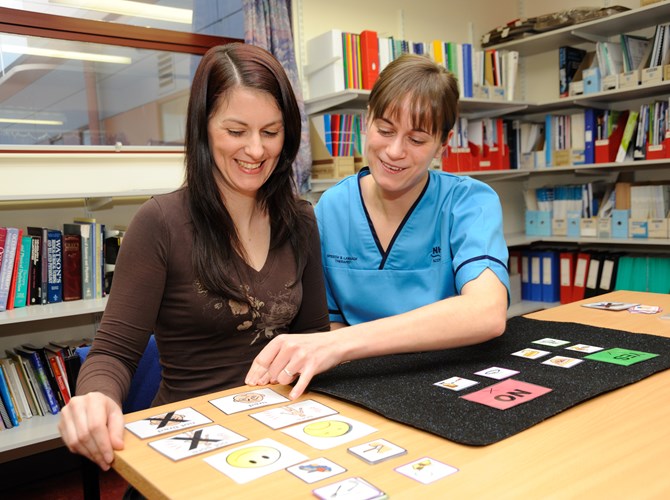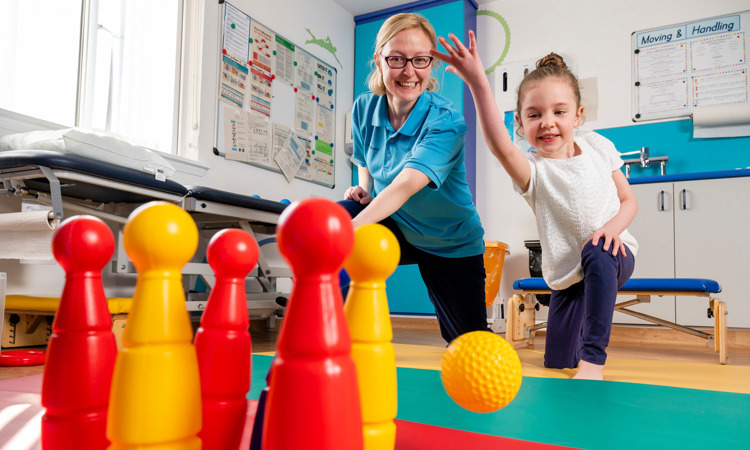How to become a speech and language therapist
You must complete a pre-registration degree programme to become a speech and language therapist in the NHS.
What is a speech and language therapist?
Speech and language therapists provide treatment, support, and care for children and adults with communication difficulties or eating, drinking and swallowing problems.

Starting your career as a speech and language therapist
Choosing subjects at school
To get on a course that could lead to a career as an speech and language therapist, useful subjects include:
- Human Biology
- Psychology
- Care
- Childcare and Development
- Physics
- English
- Maths
Speak to your guidance teacher about subjects offered at your school.

Work placements and volunteering
You may find it helpful to get some healthcare experience by doing a work placement or volunteering. You’ll get training, increase your knowledge, and learn new skills. This could help you when applying to university, college or a new job with NHSScotland.
Education and training pathway
You'll need a degree to become a speech and language therapist. Most universities accept a wide range of qualifications, giving you the option of applying directly from school or going to college first.
At college, you could do an HNC in Healthcare Practice.
Widening access
Widening participation supports adult learners who want to go to university. If you’re an adult with few or no qualifications, you could get into higher education through the Scottish Wider Access Programme (SWAP). Many universities also provide access programmes to help you get the degree entry qualifications you need.
Pre-registration undergraduate Speech and Language Therapy degree programmes
Two universities in Scotland offer undergraduate programmes in Speech and Language Therapy or Speech and Language Pathology approved by the HCPC:
- Queen Margaret University
- University of Strathclyde
Pre-registration undergraduate programmes take 4 years full-time.
Pre-registration postgraduate Speech and Language Therapy degree programme
If you have relevant qualifications and healthcare experience, you can do a postgraduate diploma or a master’s degree in Speech and Language Therapy. A pre-registration postgraduate course usually takes 2 to 3 years.
You should contact individual universities to find out about specific entry requirements.
After graduation, you must register with the HCPC. You can then apply as a newly qualified speech and language therapist for vacancies in the NHS.
Get to know the role
As a speech and language therapist, you would work with people who experience communication or swallowing difficulties for various reasons. These include:
- a developmental delay
- learning disability
- autism
- brain injury, stroke, Parkinson’s disease or
- dementia
- cancer of the mouth and throat
- a stammer
- hearing loss
Tasks include:
- assess developmental speech and communication difficulties in babies and children
- create and implement therapy programmes and work with clients to monitor progress
- support people,their carers, and family members to use alternative forms of communication
- train other professionals to deliver communication support
- assess swallowing ability
- work with clients individually or in groups
- write client reports
- supervise students and healthcare support workers
You'll need these skills:
- caring
- collaboration
- communicating
- problem-solving
- persuading and motivating people
- leadership
Speech and language therapists work with other healthcare professionals, including:
- physiotherapists
- occupational therapists
- doctors
- nurses
- healthcare support workers
- teachers
You could work in:
- hospitals and rehabilitation units
- health centres
- daycare centres
- schools
- prisons and young offenders units
- a person’s home
Learning and development
During your career, you’ll be expected to keep your skills and knowledge up to date through Continuing Professional Development. The Royal College of Speech and Language Therapists (RCSLT) provides:
- training courses
- conferences
- seminars
Visit the RSCLT website for more about training and CPD courses.
Professional bodies
When you become a qualified speech and language therapist, you must register with the HCPC to work in the NHS. You can also join the Royal College of Speech and Language Therapists.
Navigate page

You can be an AHP
Discover the range of AHP careers you can choose in the NHS.
Allied health professions
NHSScotland Careers blog
Our blog includes how-to guides, case studies, and career resources.
Discover more